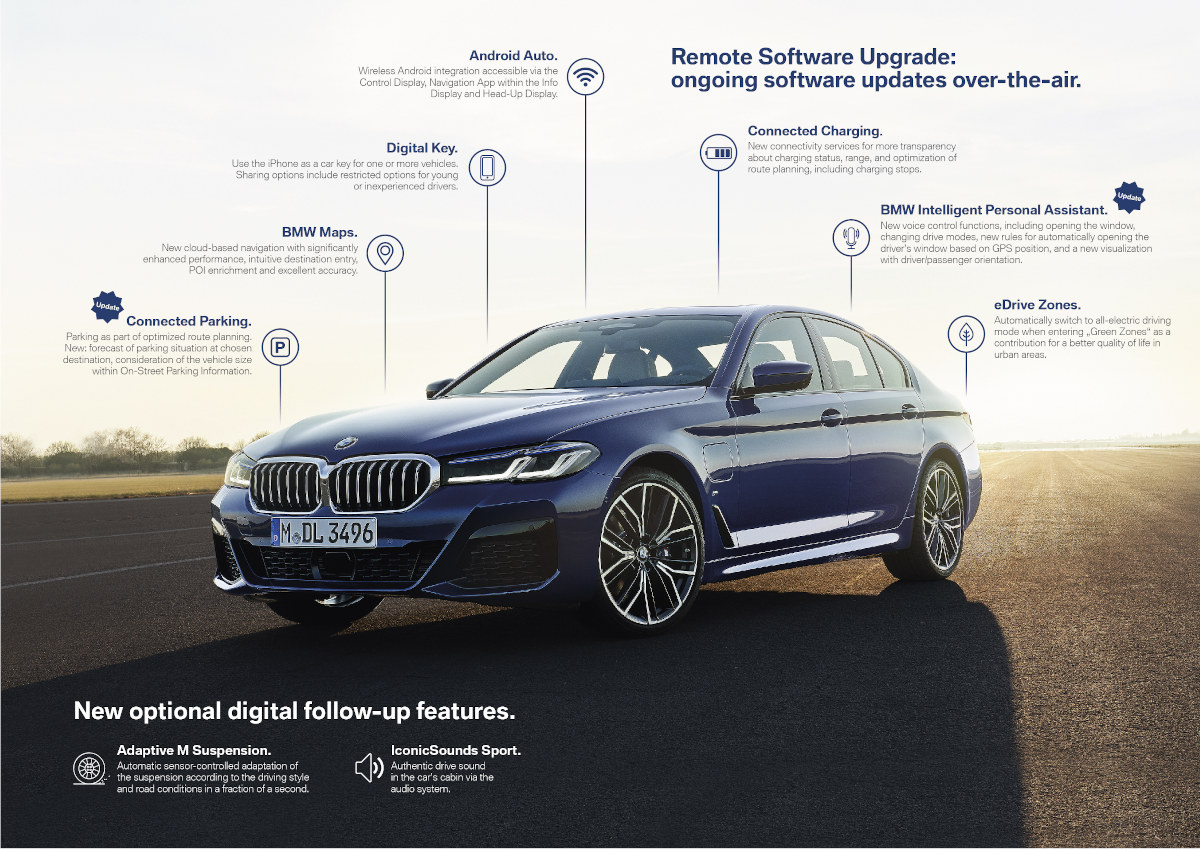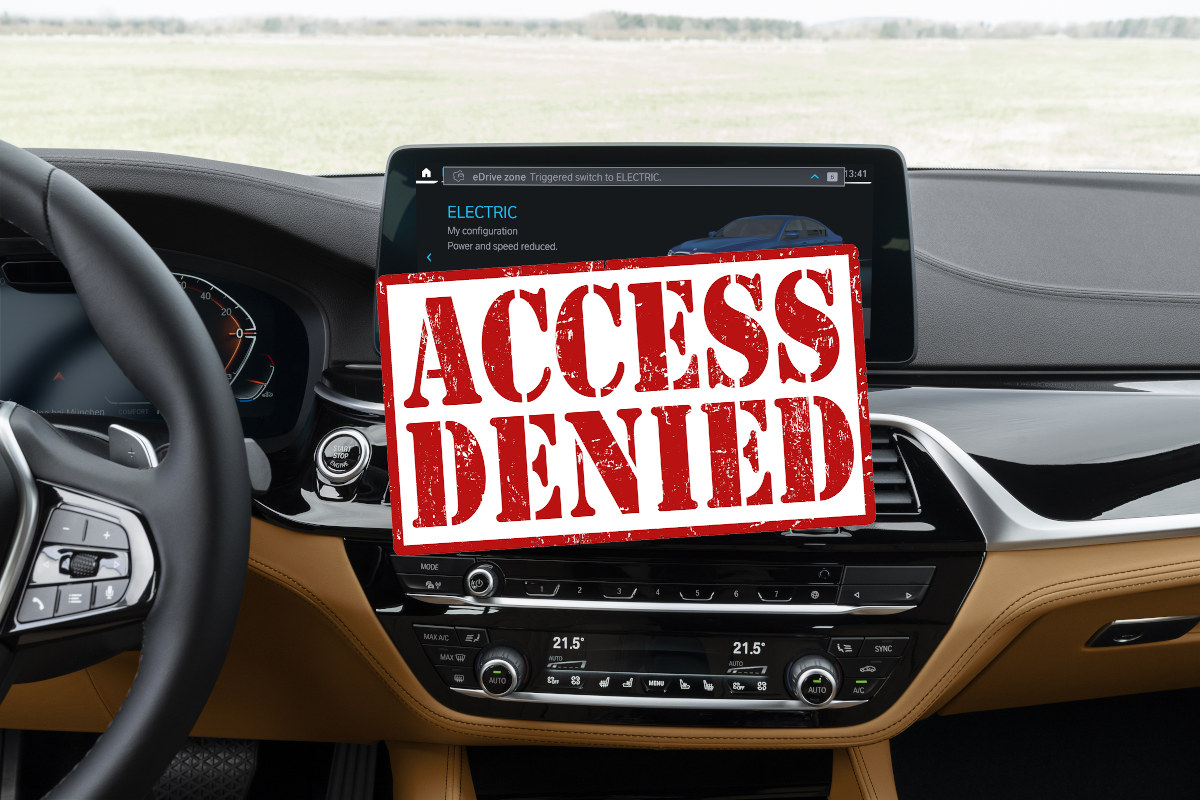Cars are getting smarter and safer, and autonomous driving looks promising but may take longer than expected, as many shortcomings still have to be worked out.
In any case, that means most new cars will be connected to the Internet in the future, especially with the launch of 5G and V2X solutions. This will bring benefits and new business models, as BMW showcased at the recent BMW Connected Car Beta Days 2020.

BMW lists a long list of new advantages of an upcoming software upgrade with improved BWM maps, connected parking to help you find parking space, connected charging to “make mobility more sustainable and innovative”, BMW Digital Key that turns an iPhone into a secure digital vehicle key, wireless support of Google’s Android Auto, and the BMW Intelligent Personal Assistant has received some improvement with the virtual character now turns towards the person talking and can distinguish between addressing the driver and the passenger. Some updates look genuinely useful, while others look like gimmicks, and some are hard to understand, e.g. what’s “connected charging” for?
But as noted by CNET and MotorTrend one of the novelties looks less appealing with “Digital personalization with functions on demand” being described as follows by BMW:
… With Remote Software Upgrade, BMW has created the technical basis for keeping vehicles up to date, adding or booking additional vehicle functions, and installing them quickly and easily over the air.
BMW already offers its customers digital services and additional vehicle functions in the form of digital after-sales, some of which are deeply embedded in the vehicle’s software. Currently available examples of these services are the High Beam Assistant, Active Cruise Control (ACC) driver assistance system with Stop & Go function, BMW Driver Recorder, BMW IconicSounds Sport, and Adaptive M Suspension (the offer may vary in individual markets). In the near future, additional functions will be added that can access the vehicle’s existing hardware and software, such as certain comfort functions or driver assistance systems.
In addition, BMW will offer an even greater degree of flexibility in terms of booking periods in the future. Customers will benefit in advance from the opportunity to try out the products for a trial period of one month, after which they can book the respective service for one or three years…
Consumers used to select options like an air conditioner or a satellite navigation system at the time of purchase, but now BMW will have the option to enable or disable some of the features by software depending on whether you pay for a subscription. This obviously does not include critical or safety functions like breaks or airbags, but currently you have to pay a subscription to use active cruise control and adaptive M suspension among others. Car companies will also have to way find to handle second-hand cars, as a new owner may not be able to access all advertised functions without paying extra.
Connected cars will also offer challenges in the future, as potentially your car could refuse to start depending on your social credit score, alcohol/drugs blood level, driving habits, a missed payment on the car loan, etc… Governments may also decide to mandate auto-fining drivers who exceed speed limits, park in the wrong location, and so on.

Jean-Luc started CNX Software in 2010 as a part-time endeavor, before quitting his job as a software engineering manager, and starting to write daily news, and reviews full time later in 2011.
Support CNX Software! Donate via cryptocurrencies, become a Patron on Patreon, or purchase goods on Amazon or Aliexpress






It will be interesting to see malware install there and ask “all your options keys were encrypted, until you pay me 3 bitcoins your car will remain at the lowest level of equipment and will be slow”.
There’s something I find worrying in these devices. They’re totally part of the vehicle and have a much shorter life. They force the owner to periodically suffer expensive hardware replacements just to support software upgrades. That’s where I find it better to let the owners use their smartphone with whatever application they prefer to find parking and access maps.
The malware risk is probably not too big.
If BMW has done a good job they will probably have a way to reset it back to default.
Or the garage could reprogram the car.
As long as there is no important personal data one can always go back to a clean slate.
The issue with malware on a PC is that you can’t access your data any more and reformatting/reinstalling would leave you to loose your data and pictures.
As long as that is not the case with a car such a hack is not too interesting.
What makes it dangerous is if a hacker can actually insert malware that controls the actualy functionality (e.g. suddenly brake or go to max speed).
Also this is not that novel. Other manufacturers have this too.
I know Ford has a FordPass Connect app that will allow you to do things like remote start and get live traffic info (at eur 99/year if I am correct).
Also Ford has in SYNC3 some apps that can be installed (some free, some paid). I have no experience with this.
Extending this to disable/enable features like AC control is pretty straightforward, but note that if a user does not select/buy a feature the manufacturer still has made the cost to implement the hardware, so there is a cost/benefit tradeoff here)
Edit: rethinking this: it would be nice of course if you are the 2nd owner
as if the big corpos have a good record of focusing on app safety and fast response to bugs.. 😉 anyway, in the past it was: i bought something, its mine to use it the way i like. now you get to rent things. and it wont change as long people keep on paying for the right to rent
> What makes it dangerous is if a hacker can actually insert
> malware that controls the actualy functionality (e.g. suddenly
> brake or go to max speed).
All car manufacturers claim they use totally separate circuits for accessory functions and critical functions. Of course this is a lie given that you can disable ASR and similar functions from the main touch screen. It means that a hacked application can also change such functions hence the car’s behavior.
Next will the car refuse to start if you fit non BMW, after market parts.
Next they will make sure you can’t legally install after market parts or you can’t obtain the necessary info needed to install them successfully.
Some manufacturers achieve this by using proprietary digital controls whereever possible. For example, the speed of the windshield wiper motors can be controlled over a CAN. The primary advantage being that any 3rd party manufacturer can’t build a compatible motor without reverse engineering the control protocol which is considered illegal hacking in certain countries like the USA (see DMCA).
Also, I am told that some manufacturers no longer provide technical specs like bolt torques to anyone but licensed repair facilities.
This reminds so much about chips in ink cartridges…
I’m pretty sure John Deere already does this to some extent.
Yes, farm and construction equipment manufacturers pioneered the “concept”. In the USA, older used farm equipment manufactured prior to this is now a hot commodity. Farmers engage in bidding wars over 20 year old tractors that they can repair themselves.